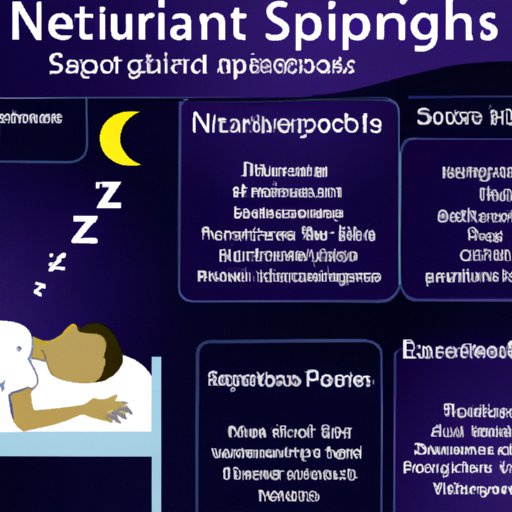
Introduction
Seizures are sudden, uncontrolled electrical disturbances in the brain that can cause a wide variety of symptoms. Many people are familiar with seizures that occur during daytime activities, but seizures may also occur during sleep. Knowing what these seizures are, how they happen, and what you can do about them is important for anyone who may be at risk. In this article, we will explore the topic of seizures during sleep, also known as nocturnal seizures, and their causes and treatments.
What Happens When You Have a Seizure in Your Sleep?
A seizure is caused by a sudden surge of electrical activity in the brain. When this happens, a person may experience a range of symptoms, including convulsions, confusion, loss of consciousness, or abnormal movements. When seizures occur during sleep, the symptoms may be less noticeable, but they can still cause problems. Seizures that happen at night can cause a person to wake up suddenly, make noises, or move around in bed. These movements can be dangerous, as they may lead to falls or other injuries.
Seizures in sleep differ from seizures while awake in a number of ways. During sleep, the brain is in a different state of activity than during wakefulness. This means that seizures may be triggered differently and may have different symptoms. In some cases, seizures during sleep may be less severe than seizures during waking hours, but in other cases they can be more dangerous.
Understanding Nocturnal Seizures: Causes, Symptoms, and Treatment Options
Nocturnal seizures are a type of seizure that occurs during sleep. There are many different causes of these seizures, including epilepsy, sleep deprivation, and other medical conditions. Understanding the cause of a seizure is important, as it can help determine the best course of treatment. In addition, knowing the symptoms of nocturnal seizures is important so that you can seek medical help if necessary.
Common causes of nocturnal seizures include:
- Epilepsy
- Sleep disorders
- Brain injury or trauma
- Withdrawal from drugs or alcohol
- Infection or other medical condition
Symptoms of nocturnal seizures may include:
- Waking up suddenly and feeling confused or disoriented
- Stiffness or jerking of the arms or legs
- Strange sensations or feelings
- Loud, abnormal breathing or moaning
- Loss of bladder or bowel control
There are a number of treatment options available for nocturnal seizures. These may include medical approaches such as antiepileptic medication, as well as lifestyle changes such as improving sleep hygiene. Your doctor will be able to help you determine which treatment options are best for your individual situation.
Medical Approaches
Antiepileptic medications are often used to treat nocturnal seizures. These medications work by stabilizing the electrical activity in the brain, reducing the risk of seizures. There are many different medications available, and your doctor will work with you to find the best option for you.
In addition to medication, other medical approaches may include:
- Vagus nerve stimulation (VNS)
- Brain surgery
- Dietary therapy (for epilepsy-related seizures)
Lifestyle Changes
Lifestyle changes can also be effective in managing nocturnal seizures. These may include:
- Getting enough sleep
- Avoiding stress and triggers
- Reducing alcohol and drug use
- Sticking to a healthy diet and exercise routine
- Keeping a seizure diary to track your symptoms
The Dangers of Uncontrolled Seizures During Sleep
Uncontrolled seizures during sleep can be dangerous and can lead to complications. Some of the risks associated with nocturnal seizures include:
- Falls or injuries
- Worsening of sleep disorders
- Increased risk of sudden unexpected death in epilepsy (SUDEP)
Complications can also arise if seizures are not treated properly. These may include changes in mood, behavior, or cognitive function. In some cases, untreated seizures can even lead to a decline in overall health and wellbeing.
If you experience nocturnal seizures, it is important to seek medical help. Your doctor can help you determine the cause of your seizures and recommend the best course of treatment.
How to Identify and Manage Sleep-Related Seizure Disorders
Diagnosing and managing sleep-related seizure disorders is important for anyone who may be at risk. There are a number of diagnostic tests and procedures that can help identify these disorders, including:
- Electroencephalogram (EEG)
- Magnetic resonance imaging (MRI)
- Computed tomography (CT) scan
In addition to these tests, your doctor may recommend a sleep study to evaluate your symptoms during sleep.
Once a diagnosis has been made, it is important to manage seizures effectively. This may include:
- Taking medication as prescribed
- Avoiding triggers or stressors
- Practicing good sleep hygiene
Therapy may also be helpful in managing sleep-related seizure disorders. This may include cognitive-behavioral therapy, which can help you learn coping strategies and manage stress and anxiety.
Living with Nocturnal Seizures: Coping Strategies and Support Resources
Living with nocturnal seizures can be challenging, but there are many coping strategies and support resources available. Some coping techniques and management strategies include:
- Keeping a seizure diary to track symptoms
- Maintaining a healthy lifestyle
- Practicing stress-reducing activities such as meditation or yoga
- Working with a counselor or therapist
- Participating in support groups or online forums
Resources for support and assistance may include local epilepsy organizations, national foundations, and online communities. These resources can provide information, advocacy, and emotional support for individuals and families affected by nocturnal seizures.
Conclusion
Nocturnal seizures can be difficult to manage, but with the right diagnosis, treatment, and support, it is possible to live a full and healthy life. If you or a loved one experience seizures during sleep, it is important to seek medical help and explore the different treatment options available. By staying informed and taking an active role in managing your seizures, you can improve your quality of life and reduce your risk of complications.
Remember, with the right treatment and support, you can manage your seizures and live a full and active life.




